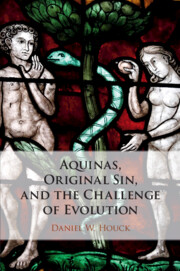Book contents
- Aquinas, Original Sin, and the Challenge of Evolution
- Aquinas, Original Sin, and the Challenge of Evolution
- Copyright page
- Dedication
- Contents
- Acknowledgments
- Introduction
- 1 Augustine and the Long Twelfth Century
- 2 Aquinas on Original Justice
- 3 Aquinas on the Effects of Original Sin
- 4 Aquinas on Original Guilt
- 5 Original Sin and Some Modern Theologians
- 6 Original Sin and the Challenge of Evolution
- 7 Original Sin
- 8 A Response to Some Objections
- Conclusion
- Select Bibliography
- Index
8 - A Response to Some Objections
Published online by Cambridge University Press: 22 February 2020
- Aquinas, Original Sin, and the Challenge of Evolution
- Aquinas, Original Sin, and the Challenge of Evolution
- Copyright page
- Dedication
- Contents
- Acknowledgments
- Introduction
- 1 Augustine and the Long Twelfth Century
- 2 Aquinas on Original Justice
- 3 Aquinas on the Effects of Original Sin
- 4 Aquinas on Original Guilt
- 5 Original Sin and Some Modern Theologians
- 6 Original Sin and the Challenge of Evolution
- 7 Original Sin
- 8 A Response to Some Objections
- Conclusion
- Select Bibliography
- Index
Summary
Chapter 8 responds to potential objections. Against the objection that my proposal is a recrudescence of “two-tier Thomism,” I argue that it is deeply congruous with Henri de Lubac’s view that nature innately desires grace. The second objection is that my view implies that a state of pure nature is impossible. I argue that it is in fact compatible with a wide variety of views of divine providence. Further objections are raised that focus on the nature of sanctifying grace, the ecumenical potential of a Thomist perspective, and Pelagianism. My proposal, I suggest, is compatible with a wide variety of views of justification, and it is not “Pelagian” in any meaningful sense.
Keywords
- Type
- Chapter
- Information
- Aquinas, Original Sin, and the Challenge of Evolution , pp. 221 - 254Publisher: Cambridge University PressPrint publication year: 2020

